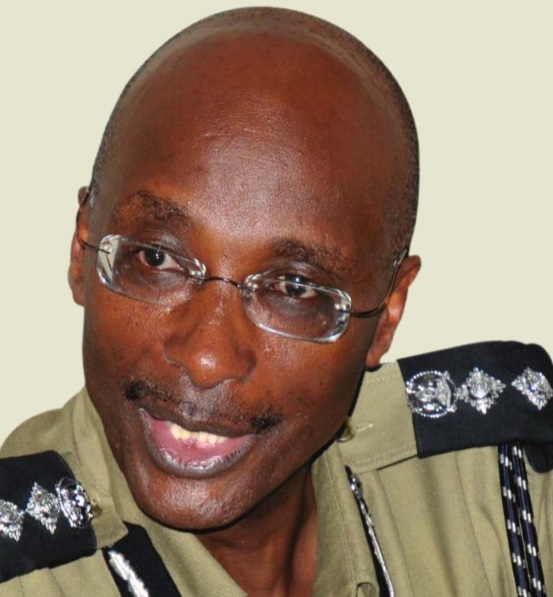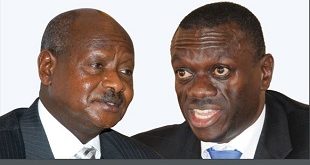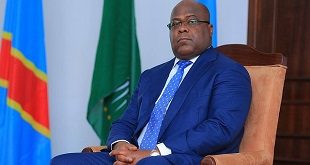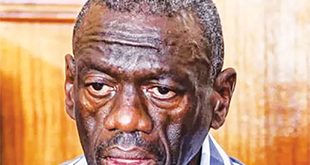
How the opposition has been joined by elements inside government to fight the IGP and the risks it poses
Over the last few weeks, the police and its Inspector General Kale Kayihura have been in the eye of the storm. The opposition see Kayihura, and correctly so, as the biggest stumbling block in their pursuit of power. He has tenaciously blocked their rallies and riots. So they want him removed. They have successfully used social media to demonise him.
Personal ambition and petty bickering of some elements in government have led them to join with the opposition in the struggle against the IGP.
While the intentions of the opposition are understandable, those of the anti-Kayihura elements inside government are regrettable, if not downright tragic. Sadly the judiciary has been unwittingly dragged into this circus – in the long term to its own detriment.
The section of the opposition led by Dr. Kizza Besigye say that they are fighting for democracy. They insist they want freedom to hold rallies and processions wherever and whenever they want in the city. Besigye sees his right to protest as the supreme political value our country should respect. And he wants to protest in complete disregard to the interests of other city users, as his processions close major roads, disrupt traffic and cause business shutdowns.
Kayihura has blocked Besigye’s plans; so the opposition accuses him of turning the police into a partisan force to defend President Yoweri Museveni’s power. That is not an entirely wrong assessment but it is an overly simplistic view of the problem.
Poor states like Uganda are by definition fragile; many of them are either failing or flailing. The biggest challenge facing them, especially when they have rapidly growing economies, is not freedom to hold rallies but the ability of the state to maintain order. This is because modernisation produces many new groups – urban workers, school dropouts, underemployed and unemployed youths, university students etc. All these want to express their anger and frustration often in a violent way. Because they are not firmly institutionalized, weak states can easily be overwhelmed by mobs demonstrating, students rioting, and workers striking etc.
Uganda is exactly in this situation. As its economy has grown, it has also produced many of these new social groups. Many of them see Besigye’s demonstrations as opportunities to express their anger, exercise power over other road users, and even cause mayhem. Many Besigye supporters want to downplay this risk or even claim it does not exist. One only needs to read their posts and threats on social media to appreciate the risk they pose to Uganda’s stability.
Besigye lacks basic organisational infrastructure to turn these people’s anger into purposeful political action. He often leads mobs over which he has no control. He has said the primary objective of his mass demonstrations is to bring about an unconstitutional change of government – because elections have been rigged. And he doesn’t even care about the repercussions of his actions – partly because he is blinded by his reckless pursuit of power and partly because he is deluded. If he succeeded in using mobs to grab power, he would not control them. Instead they would control him leading to a government by street mobs and for street mobs. But Besigye is too obsessed with settling a personal political score against Museveni, and too consumed with becoming president to appreciate the risks of his actions.
It is Kayihura who has a clear appreciation of Besigye’s aims. For we must remember that for many years, Museveni’s government sought to contain these forces by using the military.
In those days, each time police were deployed to handle a riot they would easily be overwhelmed. Consequently, police became increasingly irrelevant, often under resourced, sidelined, ignored, and therefore unable even to perform basic functions. Then Kayihura became IGP. He understood intuitively that for police to wrestle control of policing power from the army and its intelligence arm – the Chieftaincy of Military Intelligence (CMI) – he needed to position it as the enforcer of political order.
From the day Kayihura became IGP he made the maintenance of order the cornerstone of his job. This placed him in direct conflict with Besigye’s disruptive ambitions. Perhaps more than any Ugandan I know, Kayihura understood that Besigye’s claims to be fighting for democracy were a smokescreen to disguise his actual ambition i.e. to grab power by all means. Besigye had failed to gain power by electoral means and sought it by organising armed resistance. It failed. He has since sought it via mob action. He knows the streets of Kampala are teaming with angry and frustrated youths whom he uses as fodder to foster his ambitions.
In the police trying to contain Besigye’s riotous mobs, many wrong things happen as would be expected. However, Besigye’s supporters and unwitting Ugandan elites (who think their country is Belgium) have used social media to portray Kayihura as an evil man presiding over a brutal police. The Museveni administration has been beaten hands down in propaganda on social media. With the opposition controlling over 90 percent of all conversations, Besigye’s group has effectively gotten a blank cheque to brand Kayihura as they wish. The government and the NRMhave thus let down the very man who is responsible for security in Kampala.
By ensuring that he keeps Besigye’s riotous mobs at bay, Kayihura has convinced Museveni that he is the best man to be IGP. Perhaps this explains why he has been in the job for this long. It also explains why Kayihura has accumulated a lot of power, which has brought him envy and rivalry from other NRM bigwigs. It is this later development that is now causing many inside the system to seek his downfall. What would be tragic is Museveni caving in to these demands and thus firing Kayihura. That will be tantamount to abandoning one’s injured soldier on the battlefield.
But the enemies of Kayihura know that if he were removed, it would only make his successor careful. Most likely his successor would learn that it is risky to take all necessary means to contain mobs in Kampala. He would be reluctant to use the force needed to ensure order, believing that Museveni will not protect him. This may incapacitate the police in cracking down on mobs, with tragic consequences for the country, the economy and for many of Kampala’s elites who take stability for granted. It actually takes little for poor countries to go the way of Syria, Yemen, Libya, and Somalia. Kayihura understands this very well.
****
amwenda@independent.co.ug
 The Independent Uganda: You get the Truth we Pay the Price
The Independent Uganda: You get the Truth we Pay the Price



Mwenda has once again decided to be selective with the truth. If Mwenda wants to be believed, let him mention one single rally or riot that the so called opposition goons have instigated against any government facility or institution? Yet, twice now people associated or seen hobnobbing with the police attack the courts of law. He’s so forgetful not to remember
that at the nomination of Col. Kiiza Besigye there were long and wide processions from Namboole to Nakivubo without incident simply because the police kept away. It has become a common scene now, that once there is police presence then chaos is abound. The social dichotomy that he draws up between the supporters of the opposition and those that are pro government is fictitious. The people who lined up to show the IGP support were no more than what he has aptly described as “school dropouts, underemployed and unemployed youths.” It so seems that even when it is government (NRM) in trouble (or against its very own) it also finds asylum (solicits) the same people it harasses as the “opposition.” These very people, Museveni has referred to as “my voters” (he calls them the villagers). However, once these “villagers” cross to urban centres they turn into “opposition hooligans.” In Uganda, social classification is measured on the basis of geographical locality than economic status. This means that, if I have been an urban dweller and therefore an
opposition supporter, if I relocated to the village, I would automatically turnout to be an NRM supporter. Strange.
It is the same hotchpotch of political classification that President Museveni partly applies when making up public appointments. Museveni views the nation, government and the
NRM party as “one and the same.” He is at pains distinguishing party-cadres from public servants. This is the more reason as to why at the recently concluded Kyankwanzi retreat,
he invited permanent secretaries to attend an essentially NRM party gathering. General Kale Kaihura as the Inspector General of Police (IGP) is mandated by law and not by his appointee. Kale Kaihura should be directed by the Constitution and not by directives from the President. The clear fusion of the state and party (NRM)by the President, pits him on a collision path against both, his regime loyalists and dedicated public servants. There is no doubt that President Museveni has built (or made) what General Kaihura is today but just like he did with Hon. Amama Mbabazi, Gilbert Bukenya, Bidandi Ssali, Eriya Kategaya among others. He builds these personalities as bulwarks to protect him in power and not as strong alternatives that might replace him. Over the years and whether through dilettantism or dedication, Gen, Kaihura has managed to build the presence of the Uganda police although at times overlooking its professionalism . The police is more evident than any other
state security agency. This in turn, has two implications. On the one side, the police is perceived to be the vanguard of the regime, however, on the other side, it is a strong indication that other than President Museveni, there is another alternative of power and stability. This is interpreted as serious chicane in President Museveni’s long stand at the helm.
There is no covert plan to have General Kayihura fired whether within government or outside, it is rather the fusion of roles as the “topmost defender, loyalist” of
the President which inadvertently reflects on him as also the “immediate threat” to the throne. But even long after Besigye has gone, the void in the political “system” will be able to “recreate” an angry, mean looking, tough talking and delusional opponent from within, simply because, the politics breeds the character. As regarding Kaihura’s fate, the dice could have been cast the very moment the “IGP” started reading the “NRM manuscript” as his guiding manual to carry on his day to day duties. President Museveni doesn’t need
anyone’s help, or, so, he would wish to portray as much. Kaihura is being confronted by reality, that one cannot serve two masters at ago.
I just wasted my brain cells reading this so called “expert”analysis on the Kayihorror saga. To be honest, this is the same script Abdallah Kitata, the notorious boda boda lumpen would follow. Just shows how far Andrew Mwenda has fallen. This is the same tired line followed by NRM zealots that Besigye is disruptive, violent etc. Yet Besigye always asks a simple question, he has been arrested over 50 times by the regime, but not a single conviction has ever been secured! WHY?? . Andrew Mwenda , the biggest threat of Uganda descending into a Libya like situation is solely posed by M7 and his “squealors”…among whom you top
Sam, you have analysed this article’s contents in almost the same way I would have presented my own views about it.This Mwenda character calling himself an expert (in what?) is very unbalanced heaping all the blames and failures of all sorts in the country, on a single individual who has picked up courage single handedly to fighting a rogue regime Kayihura openly supports in form of partisanship while executing his public service job. However, this is not surprising to many listeners, readers and followers of Mwenda that he’s a not an independent journalist in lieu of what his newspaper stands for.
Midway reading the article I got lost! I could only see a meaningless, biased news analysis in The Independent. Only to check down first, and the author is Mr. Andrew Mwenda. Dear Mwenda, we love you. You have been our role model all these years. I was an ardent listener to your KFM talk show. Now I don’t bother with your Friday presentation. I bought and read The Sunday Monitor newspaper solely to look for your article. they were enjoying to read. Everybody admired your high level and how you connected the dots in military intelligence, economy and social issues. Now you have downgraded yourself this low on the same issues and your articles are now stale. Please re-find yourself and get back to the level of reasoning we know you for. Thank you Mwenda
1.Forewarned is forearmed govt is more than ready to crush any demonstrations.
2. Military Intelligence is the greatest weapon of any govt it cant be underestimated e.g Fethullah Gulen is currently in USA yet the Turkish govt thinks he masterminded the coup how do you think he fled Turkey?When war begins, the rich nations will always look out for sensible people(like Andrew) to rescue at all cost meanwhile, the likes of Rajab will be sweating blood.
3.We should learn how to handle our disagreements in a civilized way. You all saw how Britain handled the referendum on whether to leave the EU the results of the vote was too close to call 52% were for & 48% against. Cameron just decided to resign coz he just did not want to stress himself.
4.Politicians will always mix us up (you all saw how Boris Johnson caused confusion during the Britex debate)
5.Poor people always have alot of complexities.(e.g a poor man will have a complicated signature yet he has just 30k in his account)
6.There should be a gradual process of adapting to civilization.e.g Ugandans have known misery all their lives(although they pretend not to be aware secondly,caning is part of African culture i dont think the whites are surprised when police canes us)
7.The challenge we face now is how to manage two parallel lifestyles concurrently i.e how do the poor & rich live in the same country despite different political affiliations?
8.I dont know why Ugandans have alot of faith in democracy for us ladies, we know that every man must cheat on his wife thatswhy psychologically we are prepared we should prepare psychologically for the consequences of democracy in the third world.
Musinguzi as usual did not understand Brexit let me brief him
(i) UK withdrew from the EU.
(ii) When you hear of Brussels its just the head office of the EU its equivalent to AU’s Headquarters in Ethopia and EAC ‘s Arusha.
(iii)UK has up to 2 years to leave EU.
Inside yr analysis u mentioned 90/100 times the opposition controls propaganda that’s y u see all comments questioning Andrew’s wit.
Is the story about Kayihura or Besigye? In your shallow analysis, where is the name Tumukunde? Hogwash just.
This is tragic. The fact that Andrew Mwenda sees things in the same lens as Abdul Kitata of boda boda 2010 is the lowest we should let him go. Do you support police using clubs on ugandans for one reason that they might be supporting Besigye? Do you support mobs attacking courts? Who is trading a narrative that is taking Uganda on a highway to Somalia, You and your ilks, Besigye or both? To me, you, Kitata and those who have you as their cheerleader are far more dangerous than Besigye.
I must say i agree with Andrew on your analysis, these goons cause all the havoc in the disguise they are supporting Besigye, yet the aim of most of them is to loot what ever they lay their hands on, some even eat Bogoya free, they are a pure menace!!